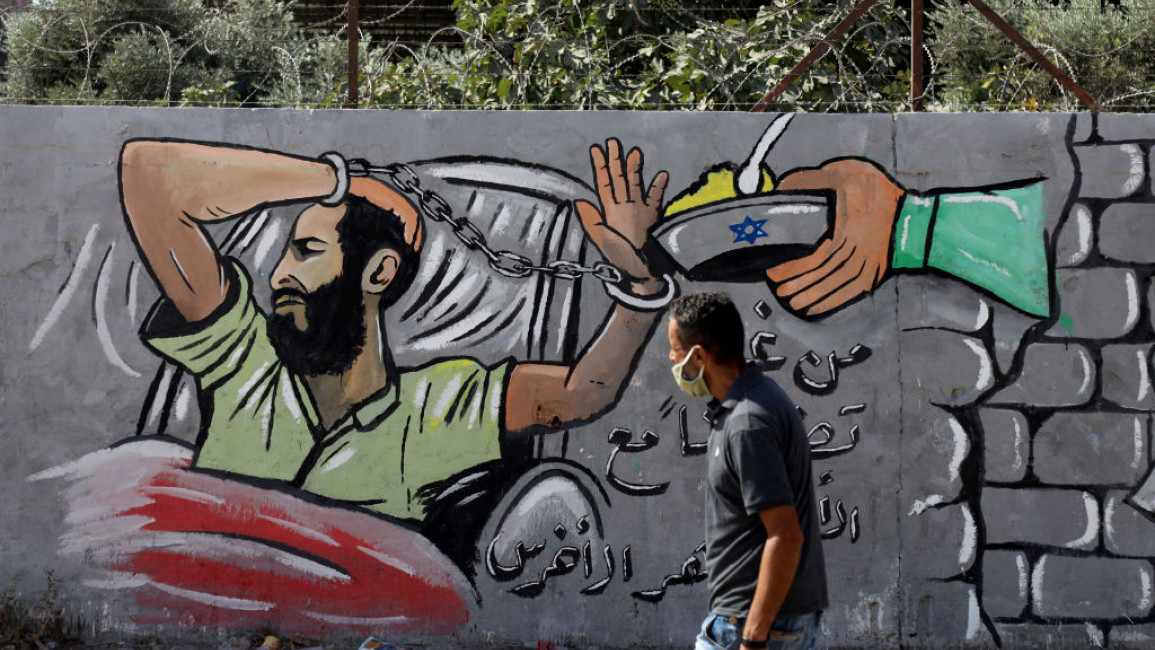
Israeli prisons and the systematic dehumanisation of Palestinian political prisoners
May 15 will mark a significant milestone in Palestinian history; 75 years since the Nakba, the day marking the displacement of hundreds of thousands of Palestinians when the state of Israel was created. Unfortunately, due to the tragic history of the Palestinian people, Nakba Day is not the only day of mourning and advocacy recognised by Palestinians and their allies. March 30 is marked as Land Day, when Palestinians commemorate their commitment to their land in the face of continuing threats. The United Nations (UN) also called for November 29 to be observed as the International Day of Solidarity with the Palestinian People, providing an opportunity for the international community to focus its attention on Palestine and the Palestinian people.
As of 1974, just seven years after the beginning of the Israeli occupation of the West Bank and Gaza Strip, Palestinians also mark Palestinian Prisoner's Day in April. It is estimated that since the beginning of the occupation, over 800,000 Palestinians have been imprisoned by Israel, many for non-violent acts of resistance or organising.
''Palestinian prisoners have engaged in multiple acts of protest and resistance to bring attention to their plight, including hunger strikes, to little effect aside from some intervention on individual cases. As with all of Israel’s many documented human rights violations, Israel’s forcible transfer and poor treatment of Palestinian prisoners persists because, simply, it can, and no entity with the power to hold them accountable is willing to do so.''
Many others have been arrested under the same tactics of arbitrary and collective punishment that underpins much of Israel’s treatment of Palestinians. For example, Israeli authorities arrested family members of the six Palestinian men who infamously escaped Israel’s Gilboa Prison in 2021, despite them having no role in the escape, simply to put pressure on the men to turn themselves in.
While some of these prisoners have actually gone to trial—unlike Israeli citizens (even settlers living in the West Bank), Palestinians from occupied Palestinian territories (oPt) are subject to military courts which have a conviction rate of 99% — many have been held under administrative detention. This means they have been incarcerated without trial or even charge.
There is no time limit on how long someone can be held under administrative detention, and the evidence used to detain them is often deemed secret and not released—even to the detained person’s lawyers. While a small number of Israeli citizens have been subject to such detention for short periods, it is almost exclusively reserved for Palestinians. Some Palestinians have been kept under these conditions for years at a time, including those detained when under the age of 18.
As of 2022, approximately 4,450 Palestinians were imprisoned in Israeli jails, with 530 administrative detainees. Over 600 have medical needs that are widely neglected. 160 of these prisoners were children, 20 of whom are kept in solitary confinement.
A well-known example of this shocking treatment is Ahmad Manasra, who was arrested at 13-years-old and interrogated without a lawyer. Despite being arrested as a young child, hit by a car and severely injured during his arrest, being diagnosed with schizophrenia, suffering depression with suicidal ideation, and ultimately being found to have not have even participated in the stabbings over which he was initially detained, Manasra has been in prison since 2013 and in solitary confinement since November 2021. Israel’s justification for maintaining his imprisonment, despite many calls for his release, is a counter-terrorism law passed years after he was even arrested.
Unjust imprisonment is just one aspect of Israel’s oppressive and discriminatory prison system. A 2015 UN report detailed ‘physical abuse and humiliation’ upon arrest and ‘physical torture and psychological intimidation’ during interrogations that include ‘beatings, solitary confinement, denial of family visits, confiscation of possessions, provocative inspection, deprivation of necessary medical care or education and unsanitary conditions of captivity.’ The UN found that Palestinian children are increasingly subject to such treatment, after being ‘abducted under terrifying conditions, most often in the darkness of night.’
Multiple reports, interviews, studies, and investigations over the decades have confirmed these conditions, including medical neglect, torture (of pregnant women and children also), and general inhumane conditions and treatment. Not surprisingly, hundreds of Palestinian prisoners have died as a result.
Aside from the plentiful evidence of the poor treatment afforded to Palestinians imprisoned by Israel, the fact of their imprisonment is itself illegal under international law. Israel remains the Occupying Power of the West Bank and Gaza Strip. Occupied territory is recognised as distinct from the territory of the occupier. Thus, Israel’s forcible transfer of people from the oPt to prisons in Israel is in blatant disregard of the Fourth Geneva Convention, which outlines the obligations of an Occupying Power.
On Prisoners' Day we share the stories of some Palestinian prisoners who have been unjustly jailed. These stories provide a snapshot of the violations Palestinians face in Israeli courtrooms and prisons.
— Amnesty MENA (@AmnestyMENA) April 17, 2023
Israel also abuses its control of Palestinian movement, especially across borders, to further deny prisoners their rights. Palestinians living in the oPt who wish to visit their incarcerated loved one have to apply for an Israeli permit for the ability to do so. These permits are regularly delayed or denied. One man being held under administrative detention joined a hunger strike to protest the lack of visitation, telling Amnesty International: “No one can visit me, my mother is in her seventies and she is denied a permit for security reasons…I don’t know when I will be released or how long I will be in prison for, I want to be able to see my family. The Israeli authorities are using the permits to punish me… I don’t know how long [my mother] has [left] and if I will be able to see her if or when I am released.”
Then there are the hundreds of prisoners for whom Israel has denied visitation altogether on so-called “security grounds.”
Palestinian prisoners have engaged in multiple acts of protest and resistance to bring attention to their plight, including hunger strikes, to little effect aside from some intervention on individual cases. As with all of Israel’s many documented human rights violations, Israel’s forcible transfer and poor treatment of Palestinian prisoners persists because, simply, it can, and no entity with the power to hold them accountable is willing to do so.
Because they are Palestinians, these prisoners are often seen merely as terrorists who are undeserving of humane treatment, regardless of the nature of their supposed crime (if they are even accused of committing one).
Just a few months ago, the new National Security Minister Itamar Ben Gvir, who has been overt about his aspirations for further settlement in Palestinian land while inciting violence towards Palestinians themselves, visited a recently renovated prison that houses Palestinian prisoners, commenting that he visited “to ensure that the murderers of Jews are not getting better conditions as a result of the construction of new cells, and I was glad to see that the Israel Prison Service does not intend to improve their holding conditions.”
The dehumanisation of Palestinians, evident in how they are treated within Israel’s carceral apparatus, is crucial to the broader project of settler colonialism that has become central to the functions of most aspects of Israel’s government as it relates to Palestinians. That the prison system is deeply embedded within these efforts, on this 49th anniversary of the first Palestinian Prisoner's Day, is unfortunately no surprise.
Yara M. Asi, PhD, is an Assistant Professor of Global Health Management and Informatics at the University of Central Florida, a Visiting Scholar at the FXB Center for Health and Human Rights at Harvard University, and a US Fulbright Scholar to the West Bank.
Follow her on Twitter: @Yara_M_Asi
Have questions or comments? Email us at: editorial-english@newarab.com
Opinions expressed in this article remain those of the author and do not necessarily represent those of The New Arab, its editorial board or staff.



